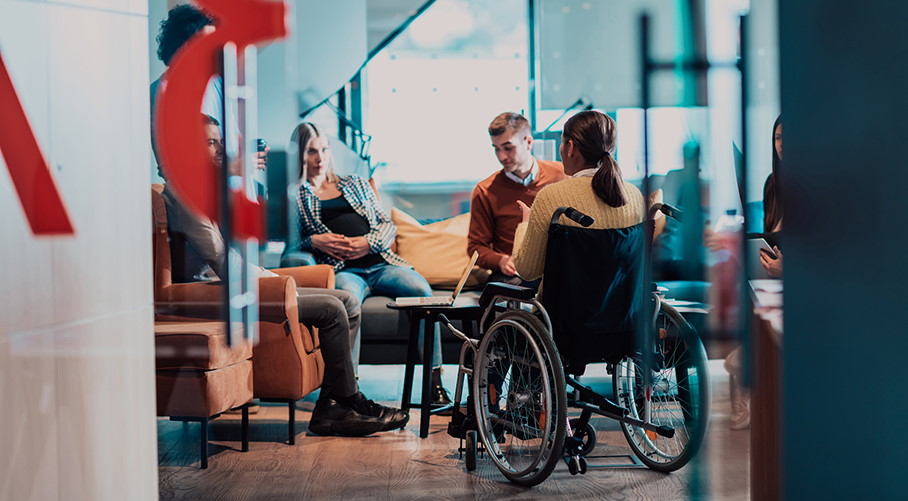Supporting the inclusion of people with disabilities
updated on Oct 21, 2025
MMA aspires to create a strong, inclusive impact that genuinely makes a difference for people with disabilities. This commitment is set against the backdrop of Covéa Group’s efforts to reinforce its Diversity, Equity and Inclusion policy to develop an inclusive culture as laid out in its new Sustainability Strategy and the Disability section of its 2025-2027 Quality of Life and Working Conditions (QLWC)(1) agreement. It echoes the Diversity Charter signed in 2017 and an initial Collective Agreement put in place for the period 2018-2020. This agreement includes provisions for material adaptations and aids, organisational adjustments, an ambitious recruitment target and also tailored training.
A plan to integrate staff with disabilities and keep them in work
By the end of 2024, the Group’s workforce included 1,449⁽2⁾ staff members with disabilities.
To continue this positive trajectory, the most recent QLWC agreement introduced measures to ensure all employees have everything they need to make a success of their jobs. It has several focuses:
- Guaranteeing equal access to career opportunities
All staff members with equal skills have the same career opportunities and can access a wide range of experiences in the course of their work, regardless of any disability they may have. - Keeping people in work
As the working population ages and careers lengthen, it’s increasingly important to ensure staff members with disabilities are integrated into the team on a long-term basis and stay in their jobs. This can be achieved by, for example, adapting workstations and making adjustments to compensate for disabilities. - Ensuring equitable access to training and career advancement
We guarantee all our staff members, regardless of their situation, equitable access to training and career advancement opportunities. - Combatting stereotypes
We actively fight prejudice and stereotypes using communication and awareness campaigns that reach all staff members. For this, we rely on our network of 70 “disability programme” disability programme champions, who talked to more than 3,000 colleagues between 2021 and 2024.
This agreement is an excellent way of changing behaviours to take account of all differences and all kinds of talent.
Long-term inclusion through recruitment
Between 2021 and 2024, we recruited 217 people with disabilities to MMA, bringing the total number to 229 by the end of the period. These figures show that we’ve made an active commitment to diversity, above and beyond the statutory minimum.
To reinforce this momentum and go even further, Covéa is rolling out concrete strategies at all stages of the employment journey by:
- Making recruitment more inclusive
Recruiters receive anti-discrimination training, and a practical guide is available to help them when recruiting people with disabilities. These tools aim to ensure the recruitment process is fair and people-centric, so every suitable applicant can find their place. - Holding an onboarding meeting focused on the new joiner’s needs
On joining the company, colleagues with disabilities are invited to a welcome and onboarding meeting organised by the disability programme and attended by their manager. This discussion is an opportunity to plan ahead for requirements, lay strong foundations for career progression and organise any necessary adaptations to the working environment. We believe in inclusion for all, so these meetings are available to every new staff member, not just those with disabilities.
These commitments demonstrate our strong conviction that recruitment is much more than just an HR function: it’s a strategic enabler by which we’re building a more inclusive, open and people-focused company.
Training as a pillar of inclusion
As part of its agreement, Covéa uses training as a means to encourage inclusion at all levels by:
- Supporting staff members with disabilities: by facilitating access to training, offering support when returning to work and setting up an accessible training pathway.
- Raising awareness across the workforce with:
- A training module to help managers support staff members with disabilities more effectively, which was completed by 96 people in 2024,
- An e-learning module called “La diversité pour faire la différence” (How diversity makes the difference),
- Targeted training for HR and recruitment teams.
These tools serve to reinforce the Group’s inclusive culture and involve all our teams in a collective strategy.
A business with an inclusive and tangible commitment
Covéa has put several strategies in place to make life easier for staff with disabilities:
- Offering personal protection schemes with enhanced support
Covéa offers personal protection solutions tailored to the specific needs of staff members with disabilities. They can access financial assistance to cover the cost of specialist services (psychotherapy, occupational therapy, etc.), purchasing medical or technical equipment (wheelchair, hoist, etc.) and adapting their home to enable them to live more independently. - Keeping employees on their full salary during parental presence leave for a period of 170 days.
- Highlighting the role of family carers and supporting them: the Group has put in place, by way of an experiment, an inclusive package of services (webinars, legal support, etc.) via an external service provider.
- Making the internet more accessible to employees and policyholders with disabilities: for example by adapting websites, mobile applications, software, telephone systems and even buildings. In addition, 130 staff members were trained in digital accessibility in 2023 and 2024, and there is an Accessibility Team of 22 ambassadors.
At the same time, the Group is committed to working with partners engaged in disability inclusion via two initiatives:
- Using service providers from the sheltered employment sector when we can: for example, we communicate with procurement departments and decision-makers to encourage them to choose suppliers from this sector.
- Supporting non-profits and sponsorship initiatives: running projects to improve quality of life for people with disabilities.
Find out about our civic initiatives to promote equal opportunity.
(1) Collective agreement on gender equality in the workplace, disability and quality of life and working conditions
(2) Covéa - 2025 - Disability Evidence - Internal and external communications materials
For further information about MMA’s insurance solutions, please contact your insurance broker



